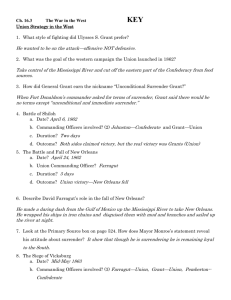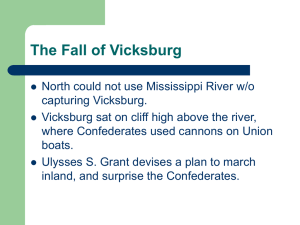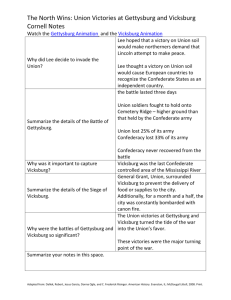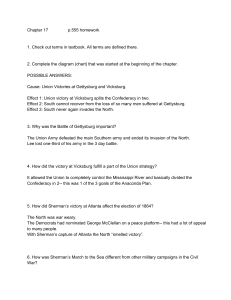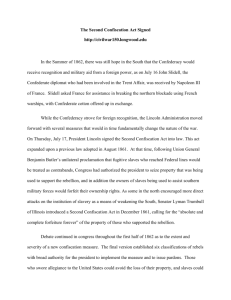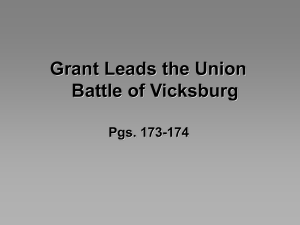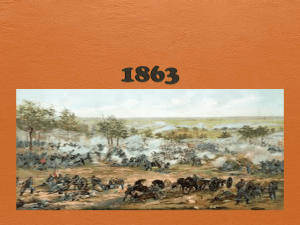Timeline of Significant Battles Period5: Civil War Battles NAME: __________________________________
advertisement
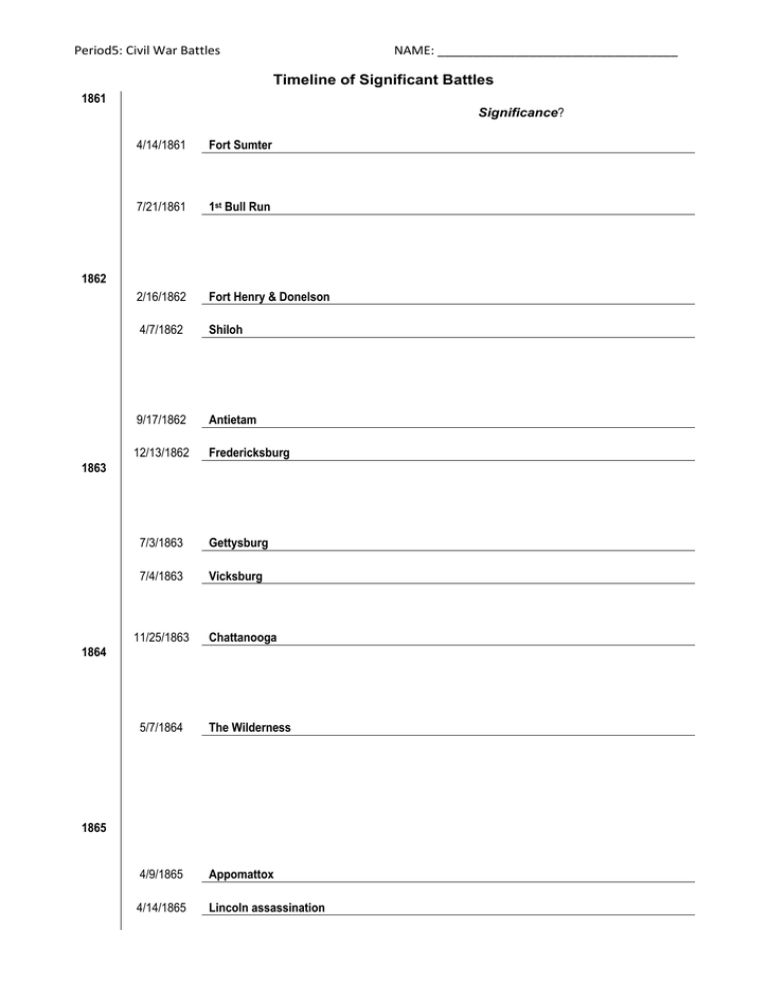
Period5: Civil War Battles NAME: __________________________________ Timeline of Significant Battles 1861 Significance? 4/14/1861 Fort Sumter 7/21/1861 1st Bull Run 2/16/1862 Fort Henry & Donelson 4/7/1862 Shiloh 9/17/1862 Antietam 12/13/1862 Fredericksburg 1862 1863 7/3/1863 Gettysburg 7/4/1863 Vicksburg 11/25/1863 Chattanooga 1864 5/7/1864 The Wilderness 4/9/1865 Appomattox 4/14/1865 Lincoln assassination 1865 Period5: Civil War Battles NAME: __________________________________ 5 Facts about Vicksburg Confederate fortress, Mississippi River, July 4, 1863 Fact #1: Lincoln & Jefferson Davis saw Vicksburg as “the key” to the Confederacy. The Vicksburg fortress commanded a sharp bend in the Mississippi River roughly 100 miles north of the Louisiana border. By the summer of 1863, Union advances had constricted Confederate control of the Mississippi River to a small section around Vicksburg. Early in the Civil War, President Abraham Lincoln, gesturing to a map of the region, declared to his military advisors that the failure to capture this city meant "hog and hominy without limit, fresh troops from all the states of the far South [for the Confederacy]." For not only would the capture of Vicksburg benefit the commercial interests and military operations of the Union, but Vicksburg was also a vital logistical link to the resource-rich Trans-Mississippi. It was here at Vicksburg that huge quantities of molasses, cane sugar, sheep, oxen, cattle, mules, sweet potatoes, butter, wool, and salt, were transported across the great river and onto every corner of the Confederacy. And it was via Vicksburg that important war material and arms smuggled through Mexican ports could defy the Federal blockade and sustain the military needs of the South. Confederate President Jefferson Davis clearly recognized why the city was worth defending, noting Vicksburg was the "the nailhead that held the South’s two halves together." Fact #2: Ulysses S. Grant captured Vicksburg by moving away from it. After bloody repulses in the last months of 1862, Gen. Ulysses S. Grant, commanding the Union Army of the Tennessee, was determined to push his army south through Louisiana, using the Mississippi River to supply his troops. His plan was to land his army below Vicksburg, taking this Confederate bastion from the South. Grant, however, realized that the terrain before him—broken by creeks and steep-sloped ravines—was well-suited for defense; his opponent would be able to contest nearly every foot of ground. Furthermore, Grant's front was constricted by the Mississippi River to his right and the Big Black River to his left, preventing him from using his superiority in numbers to overwhelm the Confederates. In the meantime, the Southern Railroad provided the Rebels supplies, and—even worse—reinforcements. If he was going to take Vicksburg, Grant had to first cut the railroad by marching northeast, away from Vicksburg. Fact #3: Ulysses S. Grant tried to take Vicksburg by storm twice before settling in to a siege. The Confederate army marched into Vicksburg on May 17, 1863, with Grant’s Federals hot on their heels. Seeing an opportunity to strike while his opponent was disorganized, Grant ordered a small-scale assault. Despite planting their colors on the Rebel works, the Yankee attackers were turned back with substantial loss. On May 22, Grant tried again. Devastated by cross-fire, the men were again forced to turn back after finding that their siege ladders were too short to scale the fortifications. With a combination of determined defense and Union confusion, Confederates again delivered another moralesapping defeat for the Union forces. All told, Grant lost more than 4,000 men in the May offensive. The Confederates lost less than 600. Although the Union army had won a string of victories in the open field, the Vicksburg defenses proved impervious to hasty attacks. The May offensive convinced Grant to lay siege to the city and starve the Confederates out. Fact #4: Grant demanded an unconditional surrender at Vicksburg—and was rebuffed. After months of Union siege, white flags began to appear above the Confederate fortifications in July of 1863. The Confederate general rode out into no-man’s land seeking open negotiation for the surrender of the city and his army. Early in the war, Grant earned the nickname “Unconditional Surrender” for the terms he bluntly offered to the Confederate garrison at Fort Donelson, Tennessee. Grant made the same offer at Vicksburg, but was refused. The two generals agreed only to a brief cease-fire. Later, after reconsideration, Grant un-characteristically relented. He offered parole to the Confederate army, which was accepted. The surrender was finalized on July 4, 1863, and the Union army took control of the city. In recognition of that day, the townsfolk of Vicksburg did not celebrate Independence Day for following 81 years. Fact #5: The capture of Vicksburg split the Confederacy in half. After receiving Grant’s message and learning that the last of the Confederate stronghold on the Mississippi had fallen, Abraham Lincoln proclaimed, “The Father of Waters once again goes unvexed to the sea.” With no length of the Mississippi River now safe from Union power, the Confederacy was unable to send supplies or communications across its breadth. Louisiana, Texas, and Arkansas were cut off from the rest of the rebellious nation. This was doubly damaging, as the Texas-Mexico border was a favorite route of secessionist suppliers and the possibility of French intervention across the border was precluded by the nigh-impassable boundary of a Union-held Mississippi River. Thus, the fall of Vicksburg has prompted many to describe it as the turning point of the Civil War.
